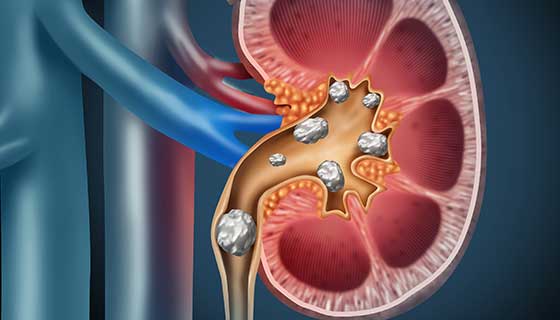Stones begin to form in kidneys when there is less fluid and excess solid waste in the urine. Stones can develop anywhere in the urinary tract not only in kidneys.
Small stones in kidneys do not show any symptoms as they easily pass without causing distress but medium to large size kidney stones find it difficult to pass through urine and cause intense pain. Stones that got stuck cause extreme unbearable pain. Symptoms start when the stone passes through the urinary system. Some common symptoms include pain in the lower back, fever, unpleasant urine smell, stomach ache, vomiting and bloody urine.
Kidney stones can be extremely painful and require proper medical treatment. Common treatment of kidney stones comprises an increase in fluid content, pain killers, medicines that makes the urine less acidic. People having small stones does not require hospital admission whereas people with large stones need to get hospitalized for further treatment. Treatment includes surgery for removing any stuck stone or any infection that has developed inside the urinary tract.
Prevention
Proper hydration – Many times color of urine indicates the medical health of a person. Ideally, the color should be pale yellow, darker color of urine indicates a sign of dehydration. The doctor recommends drinking 8 glasses of water a day.
Decrease intake of salt – Salt can cause water retention, thereby causing dehydration. Packaged foods, chips, ready to eat meals are some of the examples of high salt content food. Food that contains other forms of sodium like sodium bicarbonate, sodium nitrate, monosodium glutamate should be avoided.
Intake of Calcium Oxalate food – Consuming oxalate-rich food helps in reducing the chances of kidney stones as it binds the chemical together before they reach the kidneys. Foods containing a high level of oxalate include potatoes, spinach, whole grains, cashews and peanuts, berries, grapefruits.
Limiting caffeine intake – Caffeine accelerates metabolism and can cause dehydration. It is also important to note that some energy drinks, chocolate, soda also contains caffeine. So, it is good to avoid all these.
Sufficient intake of Calcium – Dairy products are a good source of calcium like milk, curd, etc. Consuming dietary calcium lowers the risk of stones. Calcium-fortified food materials are also useful.
Taking excess citric acid food – Good sources of citric acid are orange juice, watermelon or mango juice, unsweetened lime juice.
Taking supplements – Natural supplements are easily available that can help in reducing the risk of kidney stones. Ex – Vitamin D, Potassium Citrate, Vitamin B6 present in banana, mango, soybean, avocado, and fish oil.
Limited intake of acid foods – People should not avoid acidic foods fully as they can be a good source of protein but intake of these should be limited and monitored. Highly acidic food includes fish, cheese, eggs, red meat.
Maintaining a healthy body weight – Overweight or obesity can put pressure on kidneys. So, one should maintain healthy body weight for easy functioning of kidneys.
A person having kidney stones should drink water as half of the total fluid consumption in a day. They should avoid aerated drinks as they might contain caffeine which can increase the risk of stones.

 “Kidney stones are crystals of salts and minerals that get deposits in kidneys. Urination can be painful with this medical conditionâ€
“Kidney stones are crystals of salts and minerals that get deposits in kidneys. Urination can be painful with this medical conditionâ€






.jpeg)
.jpeg)
.jpeg)
.jpeg)
.jpeg)
.jpeg)
.jpeg)
.jpeg)






.jpeg)

.jpeg)
.jpeg)







.jpg)

